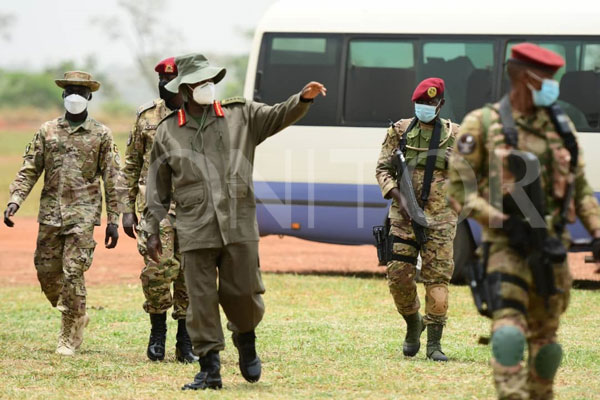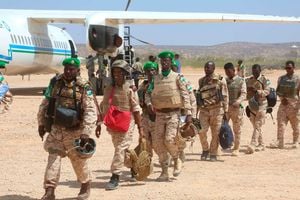Prime
Can Leadership Code Tribunal resolve the presidential immunity paradox?

President Museveni (C) gestures as he arrives at an event recently. PHOTO/ FILE
What you need to know:
- For one to drag President Museveni to any court, they would have to wait until he leaves power, but that route seems to be unrealistic considering how much he is entrenched in power. But, as Derrick Kiyonga writes, legal experts insist that the realistic option for those who want to hold the sitting President accountable is in the Leadership Code Tribunal.
When Justice Christopher Madrama joined the other four justices of the Constitutional Court in dismissing Richard Kawesa’s petition in which he wanted to be green-lighted to sue President Museveni for allegedly infringing on his copyrights when he registered the song Another Rap, the judge gave the musician some unsolicited advice.
Justice Madrama, who has since been elevated to the Supreme Court, said since all courts in Uganda have arrived at a consensus that a President can’t be dragged to court in either criminal or civil proceedings, it wasn’t the end of the story for the veteran artiste.
In absence of any other constitutional means, the judge told Kawesa to just wait until Museveni leaves office, only then will he be able to commence any action in any court with regard to his claims.
With Museveni’s party, the National Resistance Movement (NRM), successfully orchestrating plots to remove presidential term limits in 2005 which was followed by the 2017 purging of the constitutional requirement stipulating that candidates vying for the presidency be under 75 years of age, it’s now possible that Museveni could rule for life, making it impossible for anybody to sue him for his acts or commissions while he was holding power.
“I don’t think the idea by the framers of the Constitution was to forever insulate the President from court proceedings, that’s why we had term limits such that at one point a President is held to account after leaving power,” Prof Sabiti Makara, a political analyst, explains.

Combo (L-R): Former presidential candidates Kizza Besigye, Amama Mbabazi, and Robert Kyagulanyi have challenged Mr Yoweri Museveni’s election victory in court. PHOTOS/ FILE
With Article 98(4) stipulating that while holding office, the President shall not be liable to proceedings in any court, lawyers have for years thought of ways to drag Museveni to court and one of them is through filing a presidential petition.
Though the Constitution says the President can’t be sued, the same Constitution allows an incumbent to be sued in case he has been declared winner unfairly. This idea of cross-examining Museveni publicly was explored in 2001 when Dr Kizza Besigye filed his first presidential petition saying Museveni’s victory was the work of fraud.
“We looked into that idea and the other side [defence team] came to know about it and we were told they spent a whole night going through documents,” lawyer Peter Walubiri says.
The whole spectacle of Museveni being grilled in court was avoided when Besigye’s legal team decided not to file a formal application asking the Supreme Court to compel the President to give evidence.
“We discussed among ourselves and at the last minute we didn’t push that position,” Walubiri, a constitutional law expert, says. Besigye’s legal team didn’t explore the idea again in 2006, neither did John Patrick Amama Mbabazi’s legal team in 2016, nor did Robert Kyagulanyi’s in 2021.
“We didn’t explore that [calling Museveni for cross-examination] because normally the time is very limited and you have to make your case quickly,” says former Uganda Law Society president John Matovu who was part of Besigye’s legal team. “But if the President has sworn an affidavit, why can’t you cross-examine him? You have not sued him. But he has sworn an affidavit then you cross-examine him.”

The Constitutional Court hears the age limit case that removed the age limit clause from the Constitution in 2018.
To buttress his point, Matovu cites a 2001 scenario in which Olusegun Obasanjo, then the president of Nigeria, agreed to be cross-examined when he was summoned by the Human Rights Violations Investigation Commission he had personally instituted to establish the causes, nature and extent of human rights violations – in particular the assassinations and attempted killings – between January 15, 1966 and May 28, 1999.
The commission, which came to be known as the Oputa panel, was further tasked to identify perpetrators (individuals or institutions), determine the role of the state in the violations, and to recommend means to pursue justice and prevent future abuses.
While Obasanjo had first filed a protest against his summons, he eventually appeared in the much-feared witness box and he was grilled by human rights lawyer Femi Falana on the destruction of the “Kalakuta Republic” – a compound that had a free health clinic, and recording facility but was burnt to the ground on February 18, 1977, after a raid by the Nigerian military during Obasanjo’s first stint as president.
“There are several scenarios in which a president can be cross-examined in court or before a commission of inquiry. You can’t hide in being a president,” Matovu says.
Indeed, in his advice to Kawesa, Justice Madrama alluded to other options available to the singer, saying “The fact that the President is not liable to any legal proceedings in any court does not per se shut out the petitioner from attempting any other lawful engagement on his claims with the President or his representatives in an attempt to have his claim addressed amicably”.
With courts insisting that the President has absolute immunity, and he is not about to leave power such that he can be dragged to court to answer for his actions, legal experts say the only remedy for citizens is dragging the President to a tribunal established by law within the framework of Article 28(1) of the Constitution.
The Article stipulates that the determination of civil rights and obligations or any criminal charge, a person shall be entitled to a fair, speedy and public hearing before an independent and impartial court or tribunal established by law.

Justice and Constitutional Affairs minister Nobert Mao (C) meets members of the Leadership Code Tribunal in Kampala in September last year. Photo/ Courtesy
Legal experts say with the option of court out of play for citizens like Kawesa, they can petition the Inspector General of Government (IGG) who in turn is supposed to constitute a Leadership Code Tribunal to look into the issue.
“Specified leaders who are bound by the provisions of the Code are listed in the Second Schedule to the Act. The list is long but it includes the President, upon whom important office-specific duties have been cast pursuant to Article 99(1), 99(2), and 99(3),” says Isaac Ssemakadde, the chief executive officer for Legal Brains Trust, a Kampala-based democracy and human rights watchdog.
“The President is also a citizen and thus bears additional duties in ‘the Office of the Citizen’, pursuant to National Objective XXIX and Art 17. Other duties imposed on the President have been prescribed in the Code.”
The Leadership Code Tribunal gained the spotlight in the 2006 constitutional petition that John Ken Lukyamuzi, then Member of Parliament of Rubaga South, filed challenging the IGG’s decision to kick him out of the House on grounds that he had not declared his income, assets, and liabilities in accordance with the Leadership Code.
Lukyamuzi‘s major contention was that by throwing him out of Parliament, then IGG Faith Mwondha had turned herself into the “appropriate tribunal” envisaged under Article 83(1)(e) of the Constitution.
The Constitutional Court dismissed the petition, but when Lukyamuzi appealed the Supreme Court agreed with him and ordered government to set up a Leadership Code Tribunal to handle such cases.

“In the interest of enforcing values of integrity and proper conduct in the leadership of this country, values which I consider to be critical in the pursuit of development, democracy, good governance and the promotion of the rule of law, it is important that an amendment to the Leadership Code which includes the establishment of the Leadership Code Tribunal be urgently enacted by Parliament so that the Leadership Code of Conduct can be effectively enforced against the specified leaders,” Justice Jotham Tumwesigye, who wrote the lead judgment on behalf of other six justices, said.
Section 15 of the Leadership Code, which lawyers say can be used to drag the President to Leadership Code Tribunal following various amendments, says without derogating from any other written law, “a leader or public officer shall not— use his or her official position to obtain any property including land, buildings and business interests for himself or herself or his or her spouse, child, relation, friend or agent; act to the detriment of government by refusing or neglecting to settle his or her lawful financial obligations to government or any public body; be an agent of or allow himself or herself to be used to further the interest of any foreign government, organisation or individual in a manner detrimental to the interests of Uganda; practice favouritism or nepotism by giving preferential treatment to any person for personal advantage or gain for himself or herself, that of his or her relation, friend or agent, ethnic grouping or area of origin do or direct to be done in abuse of his or her office any act prejudicial to the rights of any person or obtain an unfair advantage over his or her subordinate, including abuse of the rights of a member of the opposite sex, though, among other acts, the use of coercion, threat or harassment.”

A team of lawyers representing President Museveni in the 2021 presidential election petition consult each other at the Supreme Court in Kampala.
Though the leadership tribunal is currently operational, its institution has been a painful process.
Though in 2010 the Supreme Court ordered the institution of a Leadership Code Tribunal the State went into slumber only to be woken up by Edward Sekyewa, a journalist, who in 2013 went to the High Court asking it, among others, to declare that the delay, failure or refusal by the Attorney General and its servants or agents to implement Article 235(A) of the Constitution by taking appropriate actions that would bring the Leadership Code Tribunal to life is unjustifiable.
“We didn’t win the case but we pressurised government at every turn as we pursued this case,” Ssemakadde says before giving the limitations of the Tribunal.
“Lastly, the Leadership Code Tribunal is fully operational. However, its mandate is limited to receiving reports and references from the Inspectorate [IGG] following an investigation into an alleged breach of this Code by a leader, or where prosecution or other remedial action is sought before the Tribunal.”





